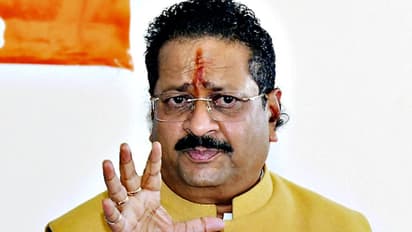What has Basanagouda Patil Yatnal achieved through his expulsion from BJP? | Opinion

Synopsis
Basanagouda Patil Yatnal’s expulsion from BJP highlights the consequences of his outspoken nature, internal party conflicts, and the shifting power dynamics within Karnataka politics.
In politics, achieving one’s intended goals requires action—mere words are not enough. Perhaps Basanagouda Patil Yatnal either didn’t realize this or couldn’t control his words despite knowing it. Ironically, he set out to “cleanse” a house but ended up being thrown out of the same house, now standing at a crossroads.
Yatnal’s situation is one where the leader says, “Go,” and the workers respond with, “Oh no!” On Monday afternoon, Yatnal went to the Parliament building in Delhi. While there, he met Prabhakar Kore and Mahantesh Kavatagi Math and took them to the Parliament canteen for lunch. Unexpectedly, Amit Shah and JP Nadda arrived for lunch as well.
When Nadda saw Prabhakar Kore, he greeted him warmly, saying, “Kaise ho, Kore Sahab?” But when Yatnal approached Nadda to speak, Nadda simply greeted him with a formal “Namaskar” and turned towards Amit Shah. When Yatnal then tried to speak to Amit Shah, Shah did not respond and instead greeted others before leaving.
Within 24 hours of this incident, Yatnal’s expulsion order was prepared, though the media was informed only the next day, on Wednesday evening.
Looking at Yatnal’s current state, one is reminded of D.V.G.’s famous poem:
“What is this world? What is all this turmoil?
What is the immense, boundless power?
What is a man’s goal, his worth, or even his face?
Oh Mankuthimma, what is the meaning of all this?”
Why Was the Decision Delayed?
On February 10, when a second show-cause notice was issued to Yatnal, Amit Shah and JP Nadda had already decided that expelling him was the only way to resolve Karnataka BJP’s crisis. This was even discussed with RSS leaders in Karnataka. However, when Basavaraj Bommai, Somanna, and Govind Karjol pleaded for leniency, promising to convince Yatnal, the high command momentarily softened its stance.
Later, when Sriramulu and Dr. Sudhakar began speaking out publicly, Delhi leaders further delayed their decision. Finally, ten days ago, JP Nadda attempted a last-ditch effort to mediate between B.Y. Vijayendra and Yatnal. While Vijayendra was willing to cooperate, Yatnal refused outright, declaring, “I will never reconcile with Vijayendra or Yediyurappa. If you want to remove Vijayendra from the president’s post, do it. I have no objections.”
According to Delhi sources, before expelling Yatnal, BJP’s national president JP Nadda consulted senior MPs, stating that there was no alternative but to remove him.
What’s Next for Yatnal & Company?
When Yatnal was denied a chance to meet BJP’s top brass, he turned to RSS leaders and reportedly declared, “If you expel me, go ahead. I will launch a new regional Hindutva party.” However, in a meeting held after his expulsion, leaders like Ramesh Jarkiholi, Pratap Simha, Arvind Limbavali, and Kumar Bangarappa advised against forming a new party. They suggested waiting for three months while attempting to convince Amit Shah through Devendra Fadnavis and Vinod Tawde. Yatnal reluctantly agreed.
However, Yatnal is not someone who stays silent for long. He might generate news for a few days, but his associates are more concerned about their future than his speeches. In politics, there is a simple rule: if you don’t get what you want, you have the right to demand it. But if you keep obstructing those who do get it, you risk losing relevance altogether.
Despite his long political career, Yatnal seems to have failed to grasp this basic truth.
The Curse of Being Too Outspoken
For ideologically committed politicians, being outspoken (“Vachali”) can often be a curse. In the past, Jan Sangh leader A.K. Subbaiah had to leave the party after attacking Bawurao Deshpande. Similarly, at the national level, Subramanian Swamy and Balraj Madhok were ousted due to repeated verbal attacks on Atal Bihari Vajpayee.
Even Anant Kumar Hegde, once an icon of Hindutva, found himself sidelined due to his repeated comments about the Constitution. Mysuru MP Pratap Simha, despite his sincere work, lost his ticket due to his abrasive speech. Similarly, leaders like K.S. Eshwarappa and C.T. Ravi suffered due to their lack of restraint in speech, losing friends and gaining enemies.
Now, it’s Yatnal’s turn. When Ramesh Jarkiholi warned him, saying, “Stop speaking like this; Delhi leaders don’t like it, and it creates problems for all of us,” Yatnal reportedly dismissed it, saying, “I am a Panchamasali Lingayat; nothing will happen to me.”
The late Ananth Kumar, a shrewd BJP strategist, always said, “Politics should be played with the brain, not the heart. But service to people should always come from the heart.”
Is Vijayendra’s Position Secure?
While BJP expelled Yatnal and issued show-cause notices to Renukacharya and Katta Subramanya Naidu—both close to Vijayendra—the real message was to curb internal conflicts. This also served as a warning to Vijayendra.
However, Delhi BJP leaders do not seem inclined to remove Vijayendra from his position at present. The real question now is whether they will formally reappoint him as president or let him continue under the existing order. If reappointed, he will remain in power until the 2028 elections; otherwise, his term will end in 2026.
Stay updated with the Breaking News Today and Latest News from across India and around the world. Get real-time updates, in-depth analysis, and comprehensive coverage of India News, World News, Indian Defence News, Kerala News, and Karnataka News. From politics to current affairs, follow every major story as it unfolds. Download the Asianet News Official App from the Android Play Store and iPhone App Store for accurate and timely news updates anytime, anywhere.